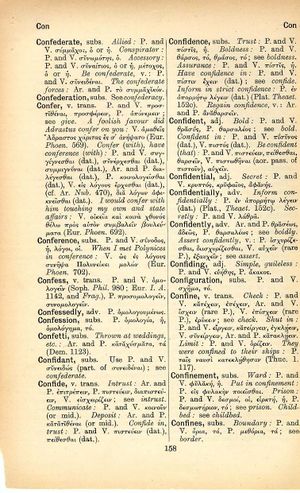confine: Difference between revisions
From LSJ
Ῥᾷον φέρειν δεῖ τὰς παρεστώσας τύχας → Facilius ferre oportet, quae incidunt mala → Recht leicht musst du das Schicksal tragen, das dich trifft
(CSV3) |
(D_2) |
||
| Line 9: | Line 9: | ||
<b class="b2">They were confined to their ships</b>: P. ταῖς ναυσὶ κατεκλῄθησαν (Thuc. 1. 117). | <b class="b2">They were confined to their ships</b>: P. ταῖς ναυσὶ κατεκλῄθησαν (Thuc. 1. 117). | ||
}} | |||
{{Gaffiot | |||
|gf=<b>cōnfīnĕ</b>, is, n.,<br /><b>1</b> partie qui avoisine, voisinage : Luc. 6, 649 ; Val. Flacc. 6, 374<br /><b>2</b> = homœoteleuton : Carm. fig. 100. | |||
}} | }} | ||
Revision as of 06:49, 14 August 2017
English > Greek (Woodhouse)
v. trans.
Check: P. and V. κατέχειν, ἐπέχειν, Ar. and V. ἴσχειν (rare P.), V. ἐπίσχειν (rare P.), ἐρύκειν; see check.
Shut in: P. and V. εἴργειν, κατείργειν, ἐγκλῄειν, V. συνείργειν, Ar. and P. κατακλῄειν.
Limit: P. and V. ὁρίζειν.
They were confined to their ships: P. ταῖς ναυσὶ κατεκλῄθησαν (Thuc. 1. 117).
Latin > French (Gaffiot 2016)
cōnfīnĕ, is, n.,
1 partie qui avoisine, voisinage : Luc. 6, 649 ; Val. Flacc. 6, 374
2 = homœoteleuton : Carm. fig. 100.

